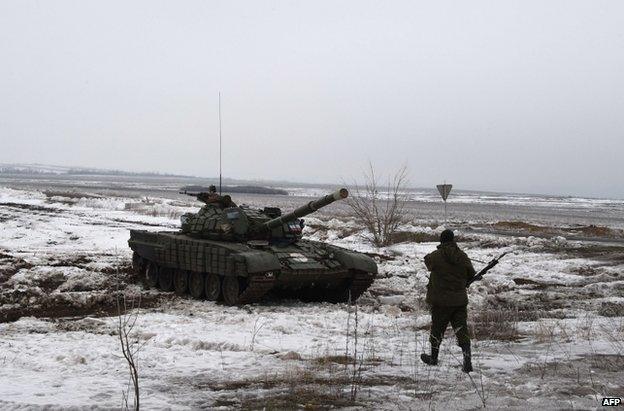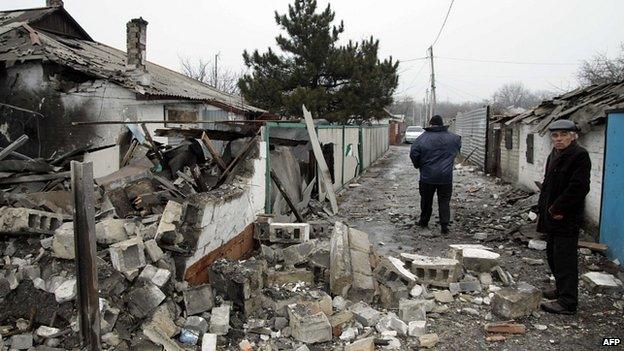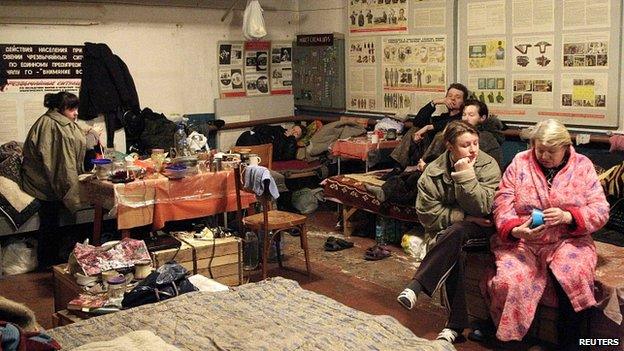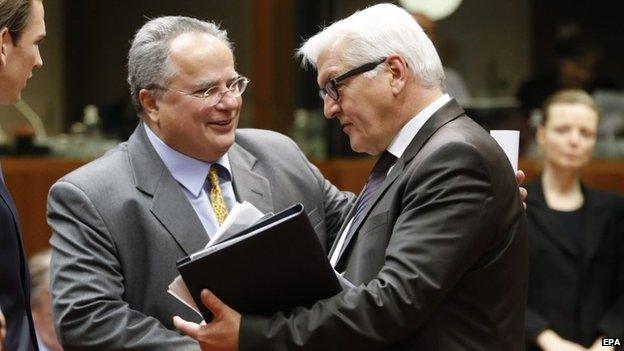Ukraine conflict: EU extends sanctions against Russia
- Published

Fighting has been raging near the town of Debaltseve in eastern Ukraine
EU foreign ministers have agreed to extend existing sanctions against Russia until September.
At an extraordinary meeting in Brussels, they also agreed to discuss names to add , externalto the list of individuals targeted for EU travel bans and asset freezes.
However, they did not agree on imposing new economic sanctions against Russia.
The ministers met as fighting raged in eastern Ukraine. Moscow denies any involvement in the conflict.
There has been further fighting in eastern Ukraine near the town of Debaltseve, the location of a strategic railway junction between Donetsk and Luhansk.
Thursday's meeting was called after the government-held port of Mariupol was shelled at the weekend, with the deaths of at least 30 people. Ukraine blamed rebels for the attack.
There was uncertainty over the position of the new Greek government - a Russian ally which says it wants to avoid a rift between the EU and Russia.
Nato says hundreds of Russian tanks and armoured vehicles are in east Ukraine.
Moscow denies direct involvement but says some Russian volunteers are fighting alongside the rebels.
The US, which has co-ordinated sanction moves with Brussels in the past year, said it was not planning an immediate new announcement itself.

Russian press eye Greek change
Under the headline "Moscow finds defender in EU", centrist daily Nezavisimaya Gazeta hopes the new Greek government may come to the Kremlin's help over sanctions.
But writing in popular tabloid Komsomolskaya Pravda, Andrey Baranov suggests that instead of risking confrontation over Russia, Athens "may trade its loyalty to Brussels for the write-off of part of its foreign debt".
State-owned daily Rossiyskaya Gazeta argues that EU plans to step up sanctions are a continuation of war on Russia and have nothing to do with resolving the situation in Ukraine.


These houses in the eastern city of Donetsk were hit during an artillery exchange

Many civilians in Donetsk are living in underground shelters to escape the fighting

Greece's new foreign minister, Nikos Kotzias (left) said the government wanted to bring the EU and Russia closer together
Tank assault
On the ground in eastern Ukraine, rebels captured the town of Vuhlehirsk near Debaltseve. Ukrainian defence ministry spokesman Vladislav Seleznyov was quoted by AP News agency as saying government troops were trying to drive them out again.
Speaking from a hospital bed in the town of Artemivsk, Ukrainian army soldier Vadim Pugovetsa told AP the attack on Vuhlehirsk had begun with an apparent tactical feint.
"Some tanks tried to break through but we repelled the first attack but that was clearly a probing move," he said.
Armoured vehicles and tanks then charged towards the town through fields in a fresh assault two hours later, he said.
More civilians were killed by shelling in Donetsk region on Thursday. While overall figures could not be verified independently, at least three civilians were killed in Debaltseve and two in Donetsk city.
More than 4,800 people have been killed and some 1.2 million have fled since rebels took control of parts of Luhansk and Donetsk regions in April.
It followed Russia's annexation of Crimea in March after a referendum which was not recognised internationally.